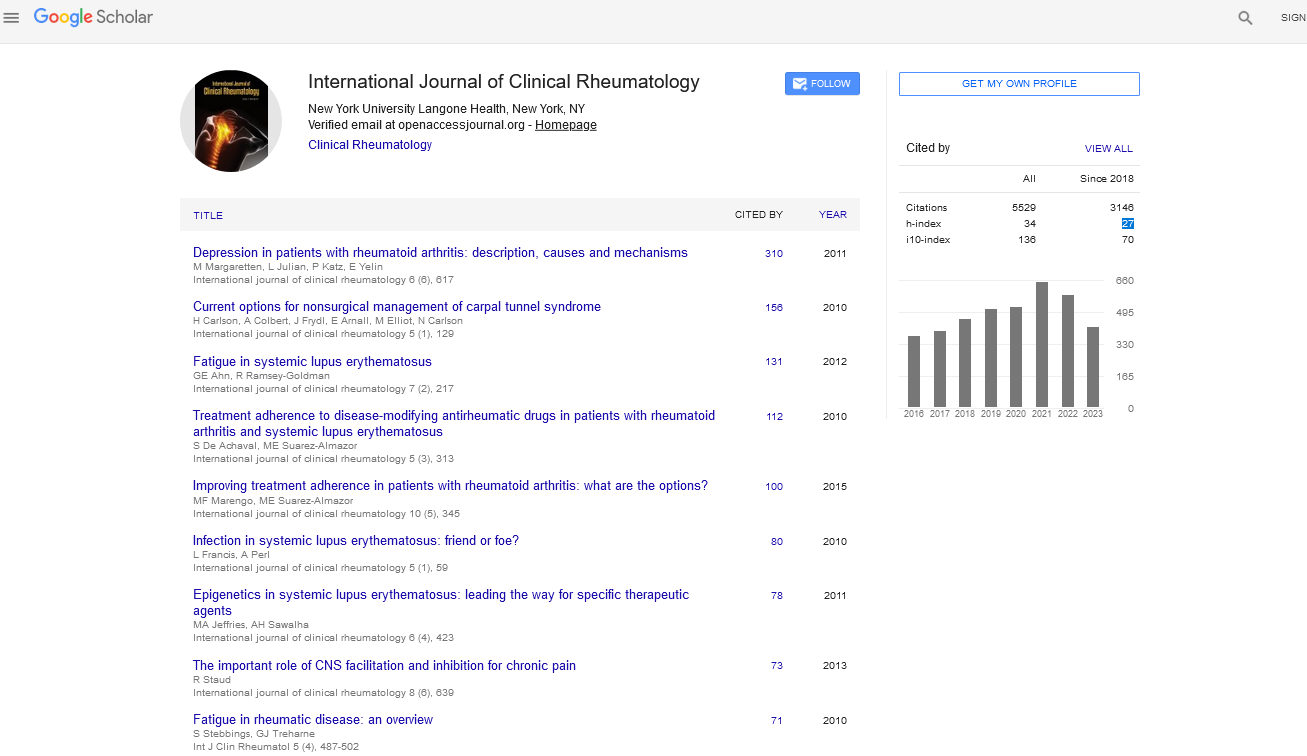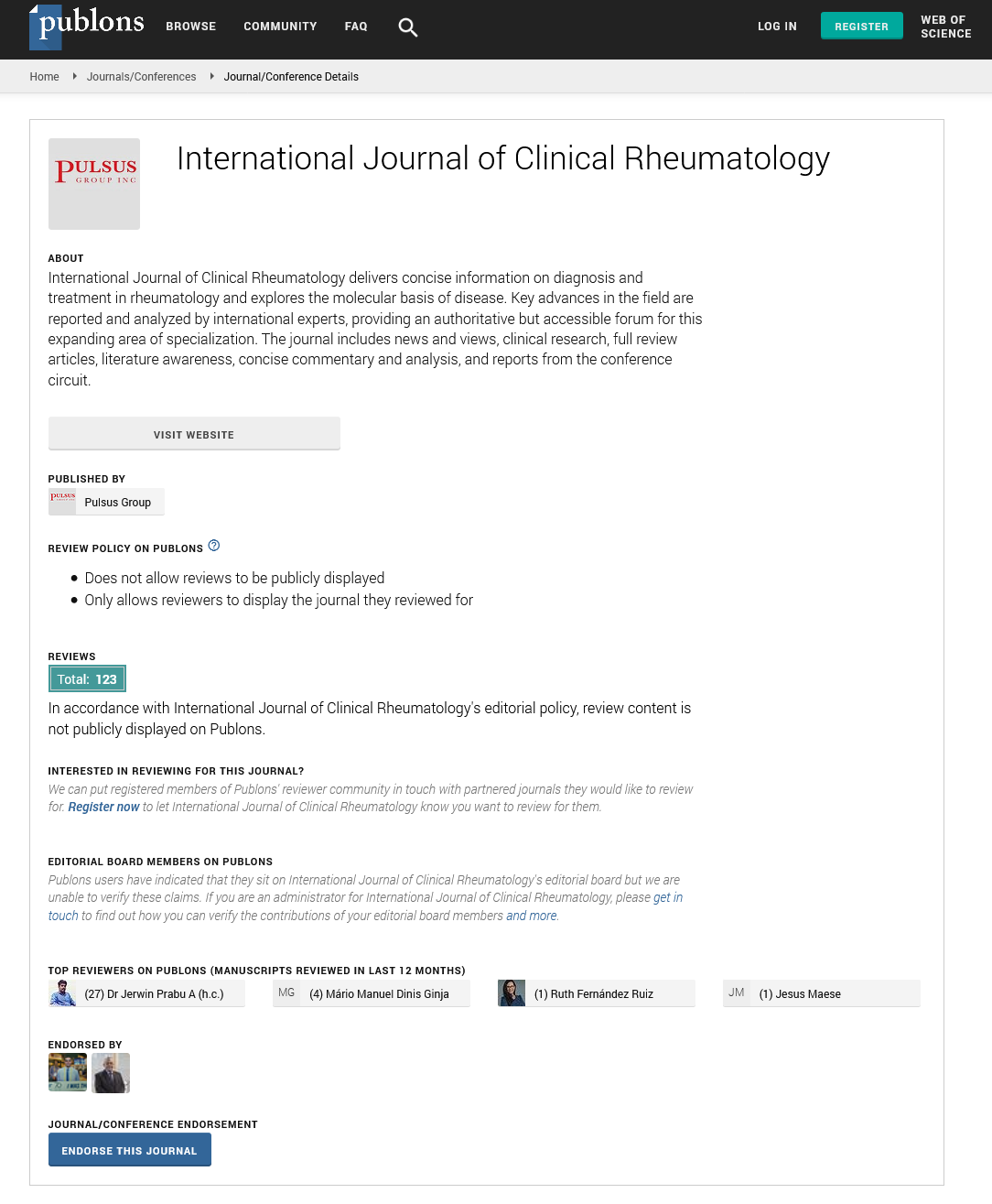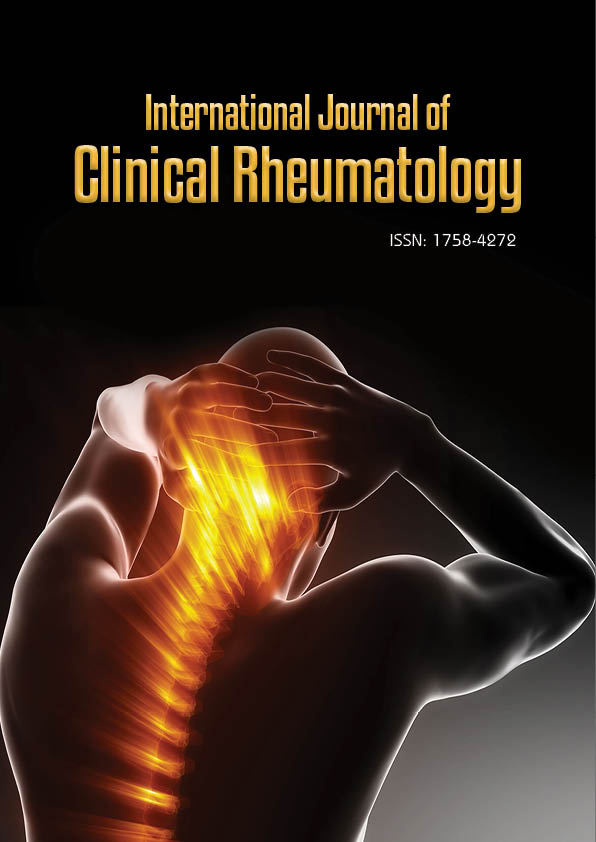Mini Review - International Journal of Clinical Rheumatology (2023) Volume 18, Issue 5
Understanding Autoimmune Diseases: Unraveling the Complexities of the Body's Misdirected Immune Response
Sebastian E Sattui*
Department of Medicine, Division of Rheumatology, Hospital for Special Surgery, USA
Department of Medicine, Division of Rheumatology, Hospital for Special Surgery, USA
E-mail: Wilshon@Joel.com
Received: 02-May-2023, Manuscript No. fmijcr-23-101178; Editor assigned: 04- May-2023, Pre-QC No. fmijcr-23-101178 (PQ); Reviewed: 18-May-2023, QC No. fmijcr-23-101178; Revised: 23-May- 2023, Manuscript No. fmijcr-23-101178 (R); Published: 29-May-2023, DOI: 10.37532/1758-4272.2023.18 (5).112-115
Abstract
Autoimmune diseases are a group of complex and chronic disorders characterized by the immune system mistakenly attacking the body's own cells and tissues. These conditions arise when the immune system, which is designed to protect the body against foreign substances, such as bacteria and viruses, becomes dysregulated and targets healthy cells instead. As a result, various organs and systems within the body may be affected, leading to a wide range of symptoms and complications. There are more than 80 known autoimmune diseases, each with its unique set of symptoms and affected areas. Some of the most common autoimmune diseases include rheumatoid arthritis, lupus, multiple sclerosis, type 1 diabetes, psoriasis, and celiac disease. These conditions can affect almost any part of the body, including the joints, skin, muscles, blood vessels, endocrine glands, and digestive system.
The exact causes of autoimmune diseases remain unclear, although they are believed to result from a combination of genetic predisposition and environmental triggers. Certain risk factors, such as family history, hormonal imbalances, infections, and exposure to certain chemicals or drugs, may increase the likelihood of developing an autoimmune condition. Diagnosing autoimmune diseases can be challenging, as symptoms can vary widely and mimic those of other illnesses. Medical professionals typically rely on a combination of patient history, physical examinations, laboratory tests, and imaging studies to make an accurate diagnosis. Unfortunately, there is currently no cure for autoimmune diseases, and treatment mainly focuses on managing symptoms and preventing further damage to affected tissues or organs.
Autoimmune diseases have a significant impact on patients' quality of life, as they can cause chronic pain, fatigue, disability, and emotional distress. Ongoing research aims to improve our understanding of these complex disorders, develop more effective treatments, and ultimately find a cure. By raising awareness, promoting early detection, and providing comprehensive care, it is possible to enhance the management of autoimmune diseases and improve the lives of those affected by these challenging conditions.
Keywords
Autoimmunity • Immune system • Autoantibodies; Inflammation • T cells • B cells • Antibodies • Immunodeficiency • Self-tolerance • Immunosuppression • Rheumatoid arthritis • Systemic lupus erythematosus • Multiple sclerosis
Introduction
The human immune system is a remarkable defense mechanism that safeguards the body against harmful pathogens, viruses, and other foreign invaders. However, in some cases, this highly evolved system can malfunction and turn against the body's own cells and tissues, leading to a group of disorders known as autoimmune diseases. These conditions affect millions of people worldwide and can target various organs and systems within the body, causing chronic inflammation, tissue damage, and a wide range of symptoms. In this article, we will delve into the fascinating world of autoimmune diseases, exploring their causes, symptoms, diagnosis, treatment options, and the latest advancements in research [1].
Autoimmune diseases are a diverse group of disorders that occur when the immune system mistakenly attacks healthy cells and tissues in the body. Normally, the immune system is designed to protect the body against harmful invaders such as bacteria, viruses, and other pathogens. However, in the case of autoimmune diseases, the immune system fails to recognize the difference between healthy cells and foreign substances, leading to an immune response directed against the body's own tissues. There are more than 80 known autoimmune diseases, each with its unique set of symptoms and effects on the body. Some common autoimmune diseases include rheumatoid arthritis, lupus, multiple sclerosis, type 1 diabetes, and celiac disease, among others. These diseases can affect various organs and systems in the body, including the joints, skin, muscles, blood cells, endocrine glands, and digestive system [2].
While there is currently no cure for autoimmune diseases, various treatment options aim to control symptoms, reduce inflammation, and manage the immune response. These may include medications such as immunosuppressants, anti-inflammatory drugs, and corticosteroids, as well as lifestyle modifications and supportive therapies. Research into autoimmune diseases continues to advance our understanding of these complex conditions. Scientists are exploring new treatment approaches, including targeted therapies and immunomodulatory drugs, with the hope of improving outcomes and quality of life for individuals affected by autoimmune diseases [3].
Materials and Methods
Understanding Autoimmunity
Autoimmune diseases occur when the immune system mistakenly identifies the body's own cells, tissues, or organs as foreign substances and launches an immune response against them. Normally, the immune system's primary function is to differentiate between self and non-self-antigens, but in autoimmune conditions, this self-tolerance mechanism breaks down, leading to an attack on healthy tissues.
Causes and Risk Factors
The exact causes of autoimmune diseases remain largely unknown, but several factors are believed to contribute to their development. These include genetic predisposition, environmental triggers such as infections, hormonal imbalances, exposure to certain medications or chemicals, and a dysregulated immune response. Additionally, certain autoimmune diseases tend to run in families, suggesting a genetic component [4].
Common Autoimmune Diseases
There are more than 80 known autoimmune diseases, each with its unique set of symptoms and target organs. Some of the most prevalent autoimmune diseases include rheumatoid arthritis, systemic lupus erythematosus, multiple sclerosis, type 1 diabetes, psoriasis, inflammatory bowel disease (such as Crohn's disease and ulcerative colitis), Hashimoto's thyroiditis, and celiac disease. Although these conditions vary greatly, they all share the common characteristic of an overactive immune response.
Symptoms and Diagnosis
Autoimmune diseases can affect virtually any part of the body, and symptoms vary widely depending on the specific condition and the organs involved. However, there are some common symptoms that may indicate an autoimmune disorder, such as fatigue, joint pain, muscle weakness, skin rashes, fever, digestive issues, and persistent inflammation. Diagnosing autoimmune diseases can be challenging, as symptoms can be nonspecific and mimic other conditions. Doctors employ a combination of medical history, physical examinations, blood tests, imaging studies, and sometimes biopsies to reach a proper diagnosis [5].
Treatment Options
The treatment of autoimmune diseases aims to manage symptoms, control inflammation, and prevent organ damage. The approach may vary depending on the specific condition, severity, and affected organs. Medications such as nonsteroidal anti-inflammatory drugs (nsaids), corticosteroids, immunosuppressants, and disease-modifying antirheumatic drugs (dmards) are commonly used to reduce inflammation and modulate the immune response. In some cases, biologic therapies that target specific molecules involved in the immune response have shown promising results. Additionally, lifestyle modifications such as regular exercise, a balanced diet, stress management, and adequate rest are crucial for overall well-being.
Advancements in Research: Research in autoimmune diseases is a rapidly evolving field, and scientists are constantly uncovering new insights into the causes and mechanisms underlying these conditions. Recent breakthroughs have shed light on the role of genetic factors, the gut microbiome, and dysregulated immune cells in driving autoimmune responses. Furthermore, advances in biotechnology and precision medicine have paved the way for personalized treatment approaches, aiming to target specific molecules or pathways involved in each individual's disease [6, 7].
Conclusion
Autoimmune diseases represent a significant health challenge, affecting millions of people worldwide. They arise from an abnormal immune response that targets the body's own tissues. Although the exact causes remain unclear, ongoing research and medical advancements offer hope for improved diagnosis, treatment, and ultimately, a better quality of life for individuals living with these conditions. Auto-immune diseases are complex and challenging conditions that arise from an abnormal response of the immune system against the body's own healthy cells and tissues. These diseases can affect various organs and systems, leading to a wide range of symptoms and complications [8]. While the exact causes of auto-immune diseases are not fully understood, it is believed that a combination of genetic predisposition, environmental factors, and dysregulation of the immune system play a role in their development. Diagnosing auto-immune diseases can be difficult due to their overlapping symptoms and lack of specific tests. However, advancements in medical research and diagnostic techniques have improved our ability to identify and differentiate these diseases, enabling earlier detection and treatment. The management of auto-immune diseases often involves a multidisciplinary approach, with treatment aimed at suppressing the immune response and managing symptoms. Medications such as immunosuppressants and anti-inflammatory drugs are commonly prescribed to control inflammation and prevent further damage to affected organs. In some cases, targeted therapies that specifically modulate the immune system's response have shown promising results. While there is currently no cure for most auto-immune diseases, ongoing research and clinical trials are continuously exploring new treatment options and potential breakthroughs. Advances in personalized medicine and the understanding of immune system pathways hold promise for more targeted and effective therapies in the future. Auto-immune diseases pose significant challenges to individuals and healthcare providers alike. However, with continued research, improved diagnostics, and comprehensive treatment approaches, we are making progress in better understanding and managing these complex conditions. Through a combination of medical interventions, lifestyle modifications, and patient support, we can strive to enhance the quality of life for those affected by auto-immune diseases and ultimately work towards finding a cure [9, 10].
Acknowledgment
None
Conflict of Interest
None
References
- Vallat-Decouvelaere AV, Dry SM, Fletcher CD et al. Atypical and malignant solitary fibrous tumors in extrathoracic locations: evidence of their comparability to intra-thoracic tumors. Am J Surg Pathol. 22(12), 1501-1511 (1998).
- Cranshaw I, Gikas P, Fisher C. Clinical outcomes of extra- thoracic solitary fibrous tumours. Eur J Surg Oncol. 35(9), 994-998 (2009).
- Demicco EG, Park MS, Araujo DM et al. Solitary fibrous tumor: a clinic pathological study of 110 cases and proposed risk assessment model. Mod Pathol. 25(9), 1298-1306 (2012).
- Park MS, Patel SR, Ludwig JA. Activity of temozolomide and bevacizumab in the treatment of locally advanced, recurrent, and metastatic hemangiopericytoma and malignant solitary fibrous tumor. Cancer. 117(21), 4939-4947 (2011).
- Roughley PJ, Mort JS. The role of aggrecan in normal and osteoarthritic cartilage. J Exp Orthop. 1(1), 8 (2014).
- Jerosch J. Effects of Glucosamine and Chondroitin Sulfate on Cartilage Metabolism in OA, Outlook on Other Nutrient Partners Especially Omega-3 Fatty Acids. Int J Rheumatol. 969012 (2011).
- Imagawa K, de Andrés MC, Hashimoto K et al. The epigenetic effect of glucosamine and a nuclear factor-kappa B (NF-kB) inhibitor on primary human chondrocytes-implications for osteoarthritis. Biochem Biophys Res Commun. 405(3), 362-367 (2011).
- Jones IA, Togashi R, Wilson ML et al. Intra-articular treatment options for knee osteoarthritis. Nat Rev Rheumatol. 15(2), 77-90 (2019).
- Leffler CT, Philippi AF, Leffler SG et al. Glucosamine: chondroitin, and manganese ascorbate for degenerative joint disease of the knee or low back, a randomized, double-blind, placebo-controlled pilot study. Mil Med. 164(2), 85-91 (1999).
- Houpt JB, McMillan R, Wein C et al. Effect of glucosamine hydrochloride in the treatment of pain of osteoarthritis of the knee. J Rheumatol. 26(11), 2423-2430 (1996).
Indexed at, Google Scholar, Crossref
Indexed at, Google Scholar, Crossref
Indexed at, Google Scholar, Crossref
Indexed at, Google Scholar, Crossref
Indexed at, Google Scholar, Crossref
Indexed at, Google Scholar, Crossref
Indexed at, Google Scholar, Crossref
Indexed at, Google Scholar, Crossref
Indexed at, Google Scholar, Crossref


